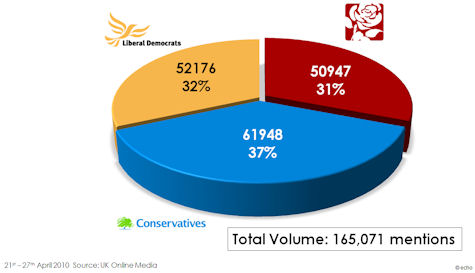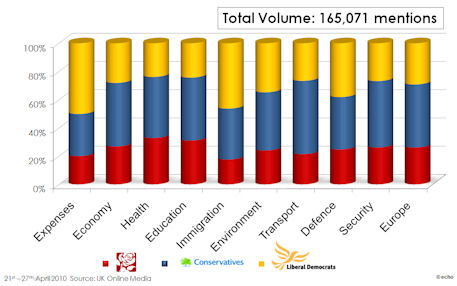This week’s research on the online coverage of the three major political parties shows that the Liberal Democrats are maintaining media interest in their party. All three parties are receiving similar amounts of coverage: Conservatives have a 37 per cent share, Lib Dems have 32 per cent, and Labour has 31 per cent. Compared to the start of the election campaign, the Lib Dems have increased their share considerably, as our first week of research indicated that just 18 per cent of election news focused on them.

Supplied by Echo Sonar
Jo-ann Robertson, Head of UK public affairs and corporate communications at PR consultancy Weber Shandwick, says that she believes Cleggmania has actually calmed down, but that his bubble hasn't quite burst yet. She explains why: “Nick had a solid performance at the second leaders’ debate, but under more scrutiny his policies and positions aren't really standing up to the test.”

Supplied by Echo Sonar
Robertson can see indications that Cameron and Brown are beginning to show the strains of the campaign. For example, when David Cameron handled a heckling Lib Dem very badly, and Gordon Brown has been caught making his now infamous "bigot" remark off camera.
When it comes to policies, Robertson says that Labour have managed to move the media on to a more serious agenda of scrutinising policy areas such as the families’ policy, crime and NHS (with Brown getting a standing ovation at the Royal College of Nursing). She compares this to the Tories, who she says: “seem to be a little rattled by the Lib Dem surge – one minute arguing that they can work with the Liberals and the next scare-mongering about the dangers of a hung parliament.”
Francis Ingham, director general of the PRCA, used to work for the Conservative Party as an election agent as well as a Tory councillor. He says that this is the first election he has witnessed where there is no particular message being emphasised by the main rival party. He says: “When I saw the ‘Big Society’ vision put forward by the Conservatives, I assumed this would be a theme they would return to. It seems remarkable that they aren’t mentioning this now, but my friends who are campaigning on doorsteps tell me that it has no resonance with the public, and no one really knows what it means.”
Ingham is therefore surprised that this Big Society message was obviously never properly tested with focus groups before the election. Of course, one of the unexpected challenges for the Conservatives, says Ingham, is that fact that the Lib Dems have come from nowhere, showing “the power of the TV debates, and the power of television to influence campaigns.”He adds: “The Tory party did not plan for a fight with the Lib Dems as their main opponent, and they are still struggling to know how to handle this.”
It appears that the upsurge of interest in the Lib Dems has flustered both parties, but the Conservatives seem the most unsettled.
MethodologyPRmoment asked Echo Sonar to analyse all UK online media coverage of the three major UK political parties in the build up to the 2010 general election. The research period was 21 April to 27 April 2010. Metrics included share of voice and volume of coverage of political issues,
PR Masterclass: The Intersection of PR and GEO
Wednesday 25th February, both virtual and in person tickets are available.
PR MasterclassIf you enjoyed this article, sign up for free to our twice weekly editorial alert.
We have six email alerts in total - covering ESG, internal comms, PR jobs and events. Enter your email address below to find out more:





